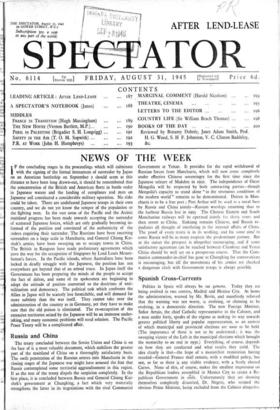Russia and China
The treaty concluded between the Soviet Union and China is on the face of it a most valuable document, which stabilises the greater part of the mainland of China on a thoroughly satisfactory basis. The swift penetration of the Russian armies into Manchuria in the closing stages of the Japanese war might have aroused the fear that Russia contemplated some territorial aggrandisement in this region. If so the text of the treaty dispels the suspicion completely. In the first place, it is concluded between Russia and General Chiang Kai:- shek's government at Chungking, a fact which very materially strengthens the latter in its negotiations with the rival Communist
Government at Yenan. It provides for the rapid withdrawal of Russian forces from Manchuria, which will now come completely under effective Chinese sovereingty for the first time since the Japanese seizure of Mukden in 1931. The independence of Outer Mongolia will be respected by both contracting parties—though Mongolia's capacity to stand alone " in the strenuous conditions of the modern world " remains to be demonstrated. Dairen in Man- churia is to be a free port ; Port Arthur will be used as a naval base by Russia and China jointly—Russian warships returning thus to the harbour Russia lost in 1905 The Chinese Eastern and South Manchurian railways will be operated jointly for thirty years. and then revert to China. Sinkiang remains Chinese, and Russia re- pudiates all. thought of interfering in the internal affairs of China. The proof of every treaty is in its working, and lot some time to come Russia will be in many respects the predominant partner. But at the outset the prospect is altogether encouraging, and if some satisfactory agreement can be reached between Chunking and Yenan China should be well set on a prosperous course. That the Com- munist commander-in-chief has gone to Chungking for conversations is encouraging, but till the movements of his Armies are checked a dangerous clash with Government troops is always possible.


























